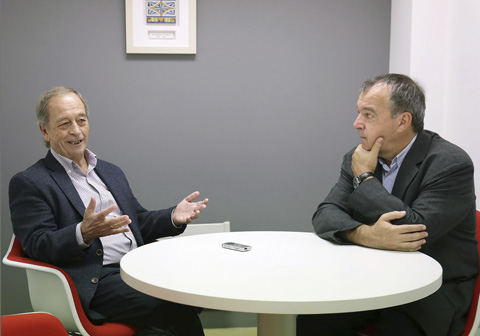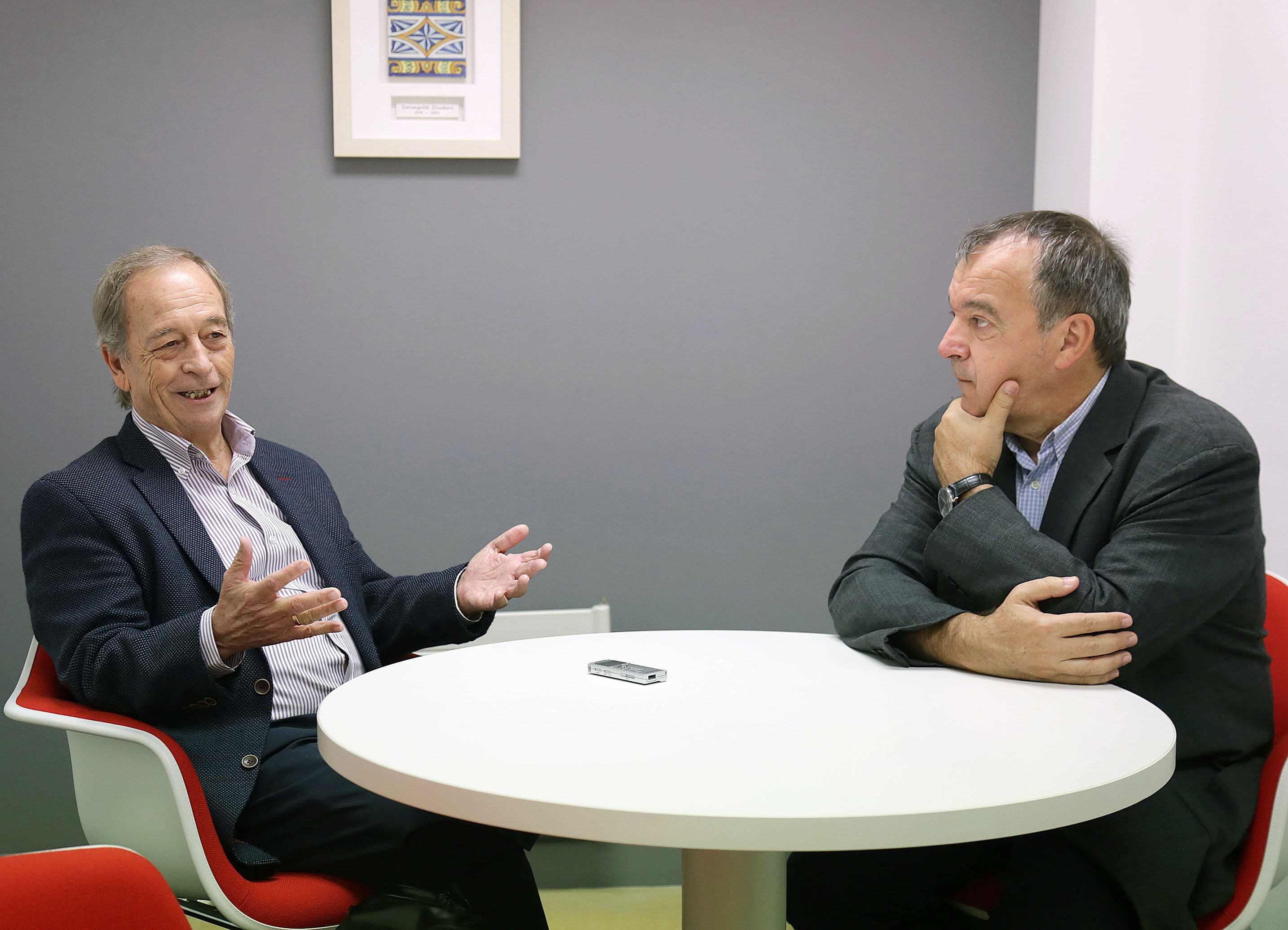Joan Mateo was in Donostia-San Sebastian to participate in the Conference on ‘Large-Scale Assessments: the case of PISA and other diagnostic assessments', organised by the Faculty of Education, Philosophy and Anthropology of the UPV/EHU-University of the Basque Country and the Department of Education of the Basque Government. Pello Urkidi, tenured lecturer in the UPV/EHU's Department of Didactics and Social Sciences, also participated in the interview.
Joan Mateo, secretary of Education Policies of the Government of Catalonia
«Having countries compete in the PISA ranking is a perversion»
First publication date: 26/10/2017

Why are large-scale assessments like PISA important?
They aren't important, they are fundamental. In these times of globalisation, having indicators that can allow us to locate each country on the globe, to get to know the level we are at in terms of the quality of our system, is the best guide we can have. What happens is that a kind of perversion that needs to be corrected has been built into them and I believe that in time this will be done.
What is that perversion?
PISA has allowed itself to be dragged along by the success arising out of the fact that in all countries we are competing to see who is at the top of the ranking in each of its tests. And that is the ultimate perversion. What needs to be done is to see what level of competence is reached in each country, analyse the most successful ones, see what the other indicators are and the contexts in which they find themselves; that will help us to understand why they have achieved them, and to see to what extent we can adopt some of these help measures. We all have talent and we can all learn from and teach one another. And PISA should be encouraging this, the exchange of experiences: to see what others are doing, and see why they are achieving good results.
Why do countries such as Korea or Singapore achieve such good results in the assessments?
They get good results, but not thanks to the system. Behind them are families with a very powerful culture of competence and competitiveness, and when school is over the students spend 3, 4 and 5 hours working after school to be more competent. The education system in Korea, which has one of the highest ratings, is possibly one of the worst systems in the world. There is a Korean making over a million dollars a year acting as the great shaman training students in competences over the internet. And people pay him. That is an aberration.
What kind of measures have been taken in Portugal, for example, whose assessment has improved a lot recently?
Firstly, Portugal has managed to change the curriculum; secondly, it has put more resources into the system; and thirdly, it has aligned its whole system to a set of strategic aims which people believe in. In my view, that is an essential element. If you access the website of its ministry you will see that they have various language tests, for English, especially, so that the students can see for themselves what their level is, and what level they are going to need. But not for accreditation or grading purposes, but simply for them to know what their own level is and to do what is necessary to go on advancing towards the level they need. In other words, they have managed to build a story for all their people in which people have accepted a strategic alignment with certain aims, which are the ones being pursued by Europe, by motivating people and streamlining their education project. I think that is the way.
There is a perception, not only because of PISA, but also because of the external assessment of the LOMCE [Spanish Education Law], that the education community finds itself overwhelmed by tests.
In the LOMCE tests loads of things are infringed. The first one: it is the teacher and not the system that should assess the student. But the State wanted to control what was going on in all the classrooms across Spain by checking every child, every school, every region, to monitor the degree of compliance with the centralised curriculum of the country, without taking into consideration the contexts, the autonomy of the schools or the diversity of the landscape… What happened there is that people obviously resisted. Now a new agreement is being made for education because they now realise that the LOMCE has to be replaced or changed. When the assessment fails, the LOMCE fails and the whole architecture generated by the State fails. After that people no longer see the tests as a threat, because they know perfectly well that the only information drawn from the tests is designed to improve the system or the school. As soon as you liberate people from thinking that it is a way of judging them, they take it for what it is: something that will help them to better understand what is happening in their schools, in their subject, in education.
On another level, the assessment of the teachers also causes quite a bit of apprehension…
When the teacher understands that if we assess her it is not to monitor her but to help her to build the way in which she is going to develop her own personal teaching career, and help her see how she is strategically going to incorporate into her own personal experience what she has to do to go on growing, the teacher stops being afraid.
In the past the assessment was the end point. Now it's the starting point. Why? Who knows where we are heading? How can you plan in a continually changing world? You can't set strategic aims if you lack assessment models that continually provide information about the system. It can't be done any other way.
Does the future of education involve doing away with awarding points out of 10 in end-of-term exams?
Education in the future is definitely not going to involve that.We are getting measuring mixed up with grading and assessment. That stuff about awarding marks out of 10 in end-of-term exams addressed the logic of grading. Now we're talking about something else, we're talking about assessment. And assessment is continuous. Continuous assessment means that the learning process incorporates elements of assessment into its own logic so that the student gradually understands at each moment how he/she is learning. It's about changing the learning methodology by incorporating the elements of evaluation in a continuous way. This has nothing to do with end-of-term exams. We are moving towards a society in which the student no longer learns exclusively at school; then we'll have to see how we can incorporate that so that it becomes part and parcel of learning for the student; that way he/she can use it as well when displaying what he/she knows, and make progress. In other words, we're going to change the concept of what we are doing. What happens is that we will continue assessing by awarding marks out of 10 for many years to come.
And final exams also look as if they're going to be around for some time yet…
More than anything else, the education system has to be a system of opportunities. Yet we're determined that it should be a system of obstacles and problems so that no one has any opportunities. In the future we'll have to think up and design an education system that instead of turning into an obstacle race in which only the select manage to get to the end, will be replaced by a system in which there is no end because the end is going to be lifelong: people are going to have to go on learning all their lives. Some will be able to get there sooner, others will arrive later, but they all have to end up being aware of their own capabilities and opportunities, and they have to be allowed to join the labour market, the real world, on the basis of the training they receive at school.
In a debate entitled "Now is Tomorrow" I raised the need to extend the compulsory nature of education up to the age of 18. I was set upon from all sides. And I told them they were hypocrites. The middle and upper-middle classes don't leave at 16; they all go on until they are 18. The ones that don't make it are the vulnerable classes. The only way for them to get there is to force them. And they said: "What do we do with the ones in class who don't want to come?" That is not the question. The question is why don't they want to come? If we were to build a space of opportunities in schools, people would want to come, people aren't stupid. Now if school is turned into an obstacle race, of course they won't want to come.



